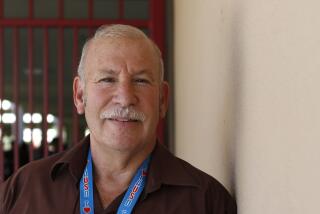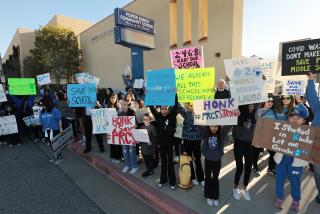Ambitious School Reform Project Off to Slow Start
Almost a year after it was announced amid great fanfare and optimism, a $106-million effort to jump-start reform in hundreds of schools across Los Angeles County has yet to spend a dime on students, teachers or campuses.
The Los Angeles Metropolitan Project (LAMP) reached an important milestone last week, when it struck a tentative agreement with the Los Angeles Unified School District that could allow the first $5-million installment--to finance training for teachers and administrators--to be paid.
Still, LAMP remains months behind its optimistic timetable. By now, dozens of schools should have been organized into “families” under the LAMP umbrella, using project funds to hire experts to help them focus on issues such as improving math or reading instruction.
And LAMP President Maria Casillas says the project’s ambitious agenda may have to be scaled back. Yet she said she remains confident that when the project ends in five years, the county’s public schools will be better.
“It will be a sad day if, in fact, we cannot build an agenda that is around the needs of kids,” she said. “But that won’t be LAMP’s failure, that will be all of our failure.”
The idealistic vision at the heart of LAMP--that smaller, more autonomous schools can foster stability and improve learning--has been clouded by the down-to-earth political, bureaucratic and technical problems that have chronically thwarted school reform here.
Those problems have raised questions about whether LAMP, which was supposed to knit together public and private efforts to overhaul schools and improve student achievement, will ever live up to its billing.
“The stakes are definitely very high,” said Roger Benjamin, director of the RAND institute on education and training, one of LAMP’s sponsors. “We can’t let the most ambitious urban reform effort in the country in the last century fail.”
The local project is part of the nation’s largest privately funded effort to improve public schools--a five-year, $500-million commitment by the Annenberg Foundation that is also paying for similar efforts in New York, Philadelphia, San Francisco and elsewhere.
Created by a group of prominent business leaders, politicians and education experts, LAMP in December received a commitment for a $53-million chunk of that money--to be matched dollar for dollar by public programs and private donations.
In the city schools, the project’s aim was to help support the district’s own four-year-old reform effort, known as LEARN, for Los Angeles Educational Alliance for Restructuring Now. Similar restructuring programs were to be helped into existence countywide.
But during months when LAMP backers had hoped to be choosing some of the 170 school participants, installing computers and sponsoring high-minded discussions of teaching, they have instead been struggling to raise money and mediating turf battles, those involved said.
Distrust and suspicion over who would share in the money have complicated working relationships among the sponsors, which include major universities such as UCLA, USC and local Cal State campuses, as well as nonprofit groups working on their own school reform projects.
Many LAMP supporters attribute the slow pace of progress primarily to prudence, saying that the project’s millions could disappear without a trace were they doled out without explicit contracts.
“I wouldn’t fault those who want to get started, but at the same time, we have to make sure we get the funds, and secondly, we have to be sure we are going to be good stewards of the funds . . . because the Annenberg Foundation people will be doing auditing,” said USC President Steven B. Sample, who former ambassador Walter Annenberg asked to convene the group that wrote the LAMP proposal and who remains on its Board of Governors.
Sample said he is not worried that money has not been spent more quickly. “I like the fact that we are taking time to think what our priorities are,” he said.
Because of misunderstandings between LAMP and Annenberg officials over what funds could be used to match the grant, the local group did not receive its first installment--a check for $7 million--until October.
That prevented Casillas--who began the job in March--from hiring a staff, which slowed all aspects of the project, including getting information about it out to the county’s schools.
Now, however, enthusiasm for the seemingly endless rounds of reform that sweep through schools is on the wane for a growing number of Los Angeles teachers, who had hoped LAMP would speed the pace of change.
“We have been working in my family [of schools] for a year now, meeting every other week to decide, when we get LAMP money . . . what would we do with it,” said Monica Studer, an English teacher at Wilson High on Los Angeles’ Eastside. “People at this point feel like, ‘Chalk it up, it’s never going to get to us.’ ”
Los Angeles County schools Supt. Donald W. Ingwerson said he senses growing frustration outside of L.A. Unified as well. Although a dozen districts have expressed interest in participating, only the Santa Monica-Malibu district has submitted a proposal and that has yet to be evaluated by LAMP.
“There is something to waiting too long and something to jumping in too fast,” he said. “We’re fast getting to the point where we have to see something demonstrable.”
The delays in Los Angeles seem to confirm the skepticism of some education observers about whether the Annenberg grants, as generous as they are, can make a difference in troubled, urban school districts.
But other cities that received the grants, including New York and San Francisco, have managed to move more quickly.
In New York, a coalition of four nonprofit groups received $25 million 14 months ago to establish 50 new, smaller schools and assist 78 existing ones. Rather than create a new organization, as LAMP did, the coalition that wrote the New York grant is overseeing its work and money is already being spent on a new computer network, the design of new schools and tools for measuring progress.
“It’s absolutely making a difference--we have schools and networks of schools that never existed before,” said Beth Lief, executive director of the Fund for New York Public Education.
San Francisco received $50 million in June--half from Annenberg and half at the behest of billionaire William Hewlett--to produce reforms in six Bay Area counties, and set January as the deadline for campuses to apply to become model “leadership” schools.
And Philadelphia, which received its grant a month after Los Angeles, already has funded a community advocacy group and a monthly newsletter explaining the reforms to teachers. Major proposals for program evaluation and teacher training are expected to be funded by its one-year anniversary.
In Los Angeles, LAMP only issued specifications for evaluating the project’s results last week. A document describing the process by which schools could qualify for the money was issued over the summer.
Until last month, Casillas has been LAMP’s only staff member and she has had to smooth feathers ruffled by the jealousies among sponsors, which has thwarted the cooperation the grant was supposed to foster.
Those groups were supposed to help the “families” of schools--especially schools not yet involved in reform projects--develop their proposals.
But their bickering has kept LAMP from completing necessary groundwork: creating a countywide computer network linking the campuses; forming groups of experts in curriculum, instruction and technology to advise schools, and devising a system to measure how the grants affect learning.
The computer network could be up and running now were it not for competition among agencies over who will run it, sources said.
The Los Angeles Educational Partnership, a nonprofit teacher training and school reform group, began testing a sophisticated network in the summer that 700 teachers are now using. But the county Office of Education and the instructional technology division of L.A. Unified are also trying to establish networks and both wanted to serve LAMP.
Casillas said she will sidestep that dispute by telling LAMP schools they can use whichever network they choose.
The process of awarding a $3.8-million contract to evaluate LAMP’s work also caused tension. UCLA has a nationally known center for educational assessment that is a LAMP sponsor. USC and the RAND Corp. of Santa Monica also have experts in the field. But other LAMP “sponsors” have called for seeking contract bids nationally, to avoid the appearance of favoring the organizations that helped write the LAMP proposal.
Phyllis Hart, executive director of the Achievement Council--a LAMP sponsor--was among those who pushed for opening up the competition. Hart said the minority communities she represents want more say in what would be evaluated, which she felt could best occur by opening the process to other bidders.
“The challenge for LAMP is to look at achievement level separately for African American, for Latino, for limited-English students,” Hart said. “Because when you look at the differences, there are huge gaps.”
UCLA education school Dean Theodore Mitchell said the debate is a legitimate one.
“Is it going to be a question of spreading the wealth or is it going to be . . . about getting the job done,” Mitchell said. “Those are equally valuable goals . . . and the goal is to do both.”
The single most time-consuming task for Casillas has been negotiating the agreement with Los Angeles Unified, where the LAMP money will support and spread the LEARN reforms. LEARN, now active at 192 schools, turns over financial and policy decisions to campuses that promise to improve student achievement.
Talks to pin down exactly what the district would do in return for receiving about half of the total Annenberg grant pie began over the summer.
Last week, after several deadlines set by LAMP had passed, the district agreed informally to a three-page “memorandum of understanding” that commits it to a number of bold policy changes.
For example, the district has agreed to set high standards for LAMP schools and employees and create a sophisticated monitoring system to make sure they are met. Schools that do not meet the standards will lose accreditation. Employee shortcomings are to be addressed and successes rewarded.
The commitments are similar to those already required under LEARN, but Supt. Sid Thompson pointed to one major difference: The district could be required to repay the Annenberg funds if the commitments are not fulfilled.
“I don’t disagree with it,” he said, adding that he knew the district had “stumbled” and “put up roadblocks” to LAMP at times, but attributed the missteps to an abundance of caution.
One source close to the negotiations, however, chided the school district for being too cautious, then trying to blame the slow pace of the talks on the need to negotiate details with its employee unions, especially the powerful UTLA. “They’re scared,” the source said. “They have the power to do a lot of this” without negotiating.
Teachers’ union President Helen Bernstein blamed the delays on LAMP’s decision to work directly with the district, instead of through the nonprofit organization that began LEARN, which includes union leaders.
“Everybody knows the danger in the control being wrenched away from LEARN [and] having bureaucrats in charge,” she said.
LAMP hopes to have the L.A. Unified agreement signed before Nov. 16, when it is planning a one-year anniversary celebration at the Los Angeles Central Library Downtown. The district’s commitment could provide a model for other districts to follow, Casillas said, and thereby speed up the progress of LAMP reforms elsewhere.
“There are two or three very bold things we are asking from Los Angeles and they didn’t say no,” Casillas said. “What we are doing right now is getting to the real hard matters of reform.”
More to Read
Sign up for Essential California
The most important California stories and recommendations in your inbox every morning.
You may occasionally receive promotional content from the Los Angeles Times.






